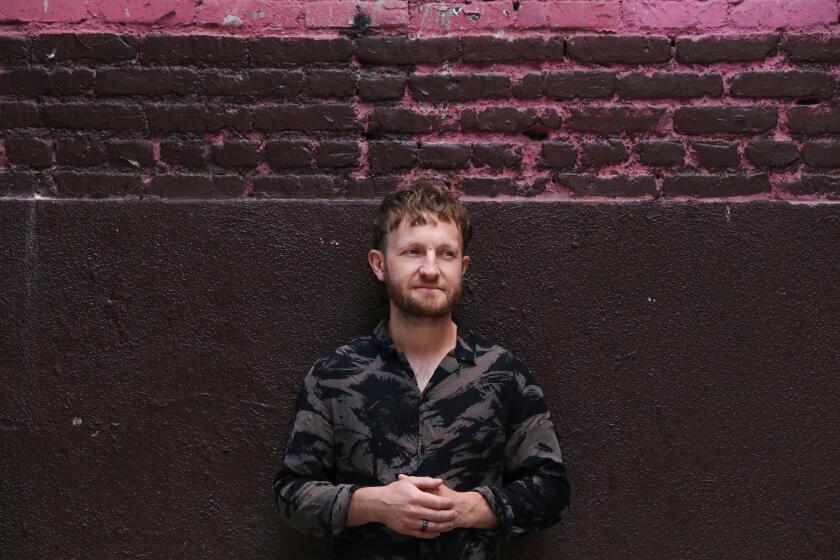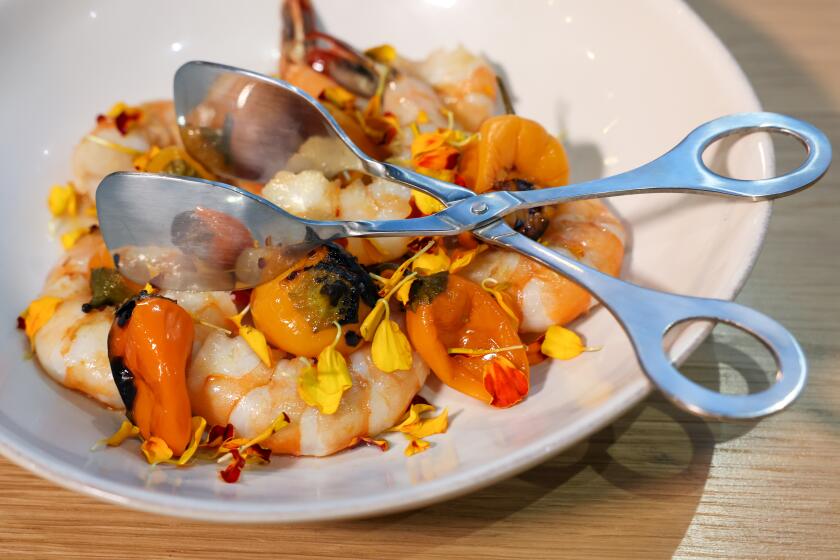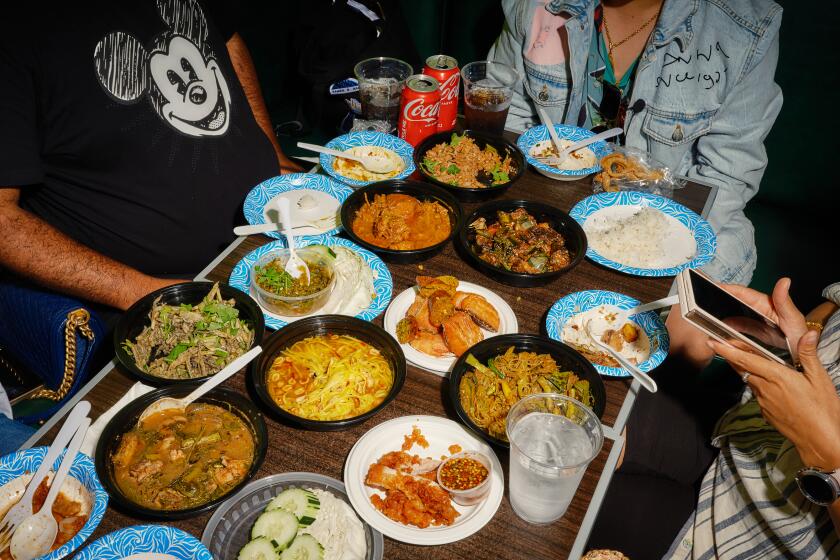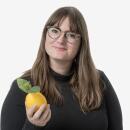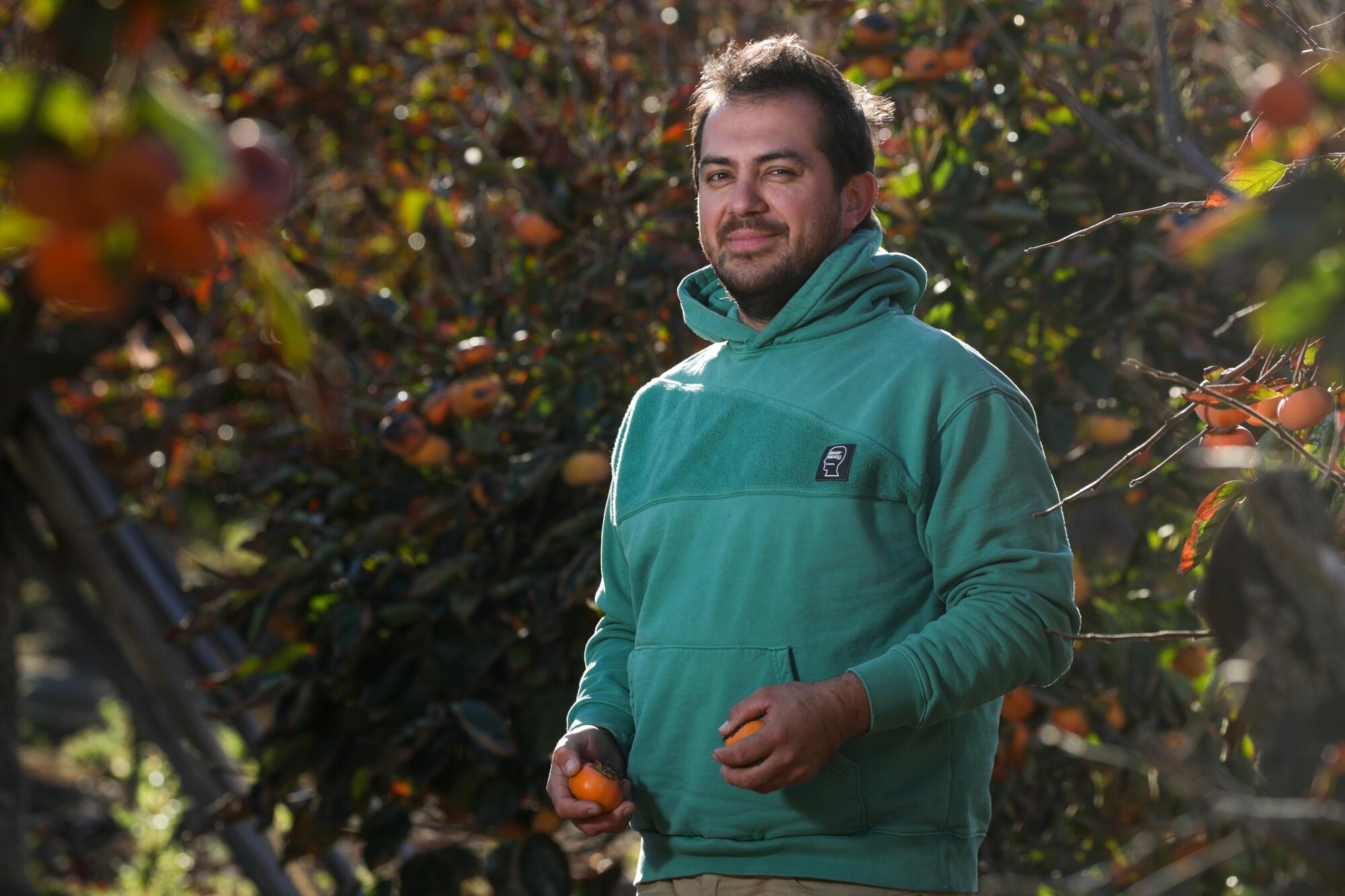
Chef Balo Orozco started Sunset Cultures, a kombucha-and-condiments business, helping local farmers — and the environment — along the way
- Share via
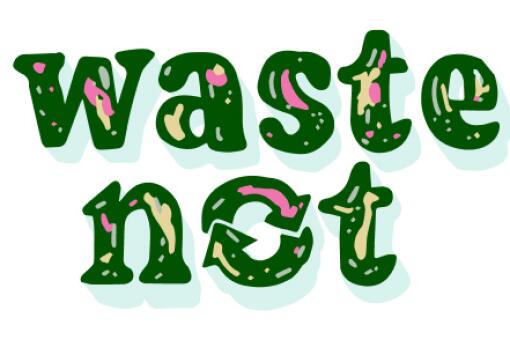
ONGOING SERIES
Conversations about food, the environment and our future.
Balo Orozco’s freezer is full of nectarines. Well, one of them is. The other is full of plums. At his commercial kitchen in South L.A., the chef is fermenting 100 pounds of chiles in orange juice. He’s lightly simmering berries to make kombucha. He’s scooping up excess unsold or “ugly” fruits and vegetables from local farms and reimagining them into some of L.A.’s most creative kombuchas, hot sauces and condiments through Sunset Cultures, his pandemic-spurred project that’s taken on a retail life of its own.
Due to the growth in business — and demand — most days of the week are spent working, and many of those involve driving. In his black Prius, Orozco traces a path to farms across the state or to farmers markets for designated pickups of boxes or pallets of produce that would otherwise be thrown out or composted. His friends who own other beverage companies tell him to purchase fresh juices from larger businesses, but that would limit the goal at the heart of Sunset Cultures: to curb food waste for local farmers and to help them recoup their losses from otherwise unused, unsold fruit and vegetables.
The chef of Silo, London’s lauded closed-loop, zero-waste restaurant, shares best practices for food service in L.A. and beyond
“The idea of his company was perfect for food waste that happens naturally,” said Rick Dominguez, the owner of Rick’s Produce and the farmer to inspire the beginnings of Sunset Cultures. “[Orozco] said instead of waste, make something glorious from it; it’s already not sellable [for] retail and not sellable [for] wholesale, but it still tastes delicious, it’s still alive, it still can become something beautiful. That’s where he comes in.”
This early winter morning Orozco is picking up boxes of persimmons and fistfuls of avocado leaves in Fallbrook from Dominguez, who operates Rick’s Produce outposts in Virgil Village and the Original Farmers Market. The avocado leaves will be used for cooking savory dishes, while neighboring farm Rancho la Paz de Mi Corazón’s late-season fig leaves, which give off an almost coconut-like scent, will be used in a future kombucha with surplus cherries from Murray Family Farms.
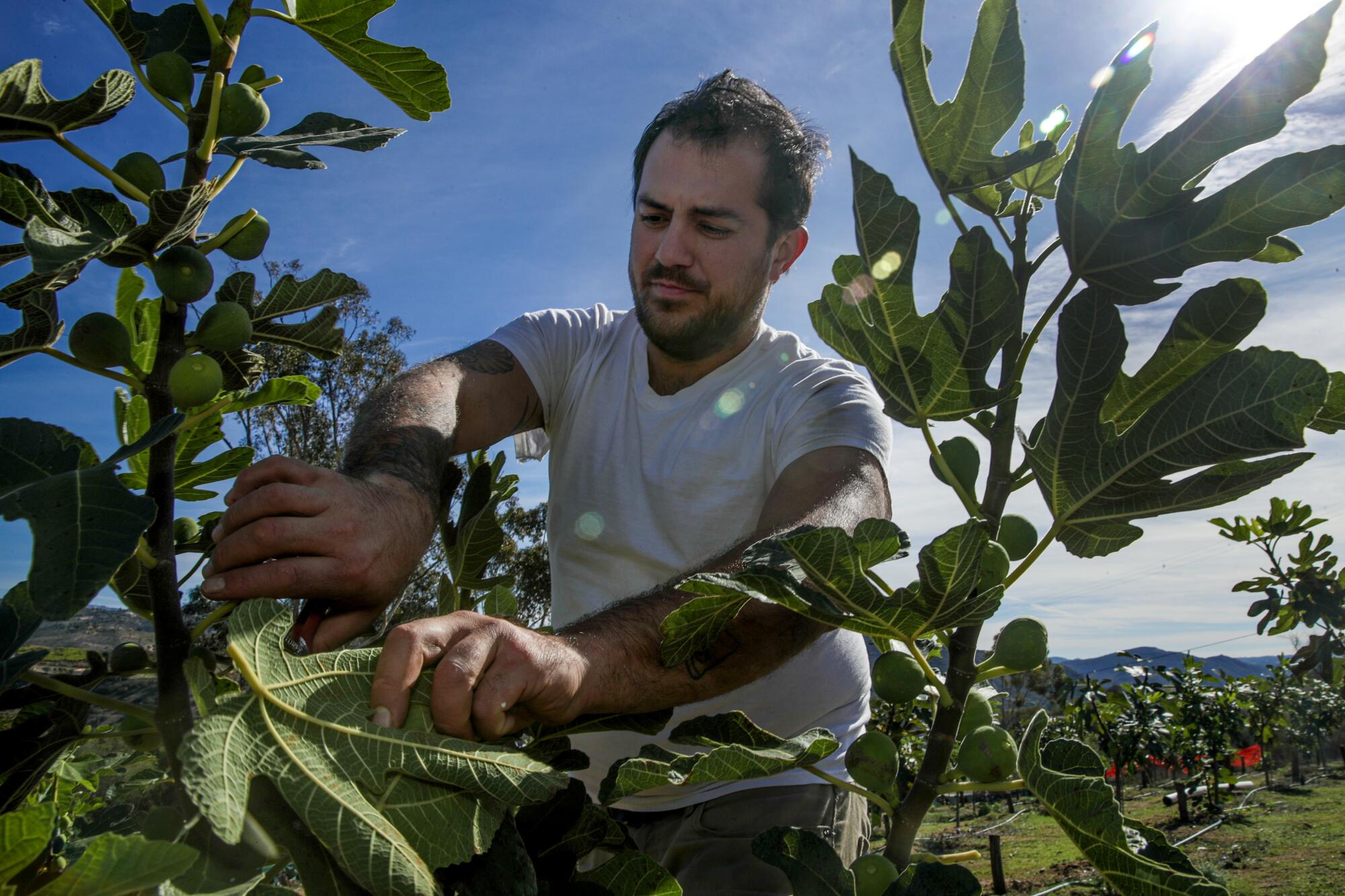
Since the inception of Sunset Cultures in spring of 2020, Orozco — along with co-founder Jacqui Harning — has been brewing hot sauces from eggplants, making five-spice syrup from jujubes and fashioning vinegar from persimmons. The sheer volume of produce used ranges in scope; last year, Rick’s Produce provided a whopping 1½ tons of persimmons, while this year, Windrush Farm offered 85 pounds of strawberries.
This season, Orozco sourced nectarines from Ken’s Top Notch Produce in Reedley and BriarPatch Food Co-op in Grass Valley, — much of it “ugly” fruit that was still edible and delicious but, due to misshapen form or marring, likely would not sell at a market. The chef picked up 800 pounds of the stone fruit one morning (it took two trips), then broke the haul down in batches — washing and coring them, leaving the skin intact for flavor, then freezing it all for use in future kombucha, jams or hot sauces. Often he’s inspired by the surplus, or he’s on the hunt for specific flavors he’d like to create.
The chefs behind Slow Burn hit the road with their mobile larder — jars of every bit of every ingredient preserved — toward a zero-waste future.
“I think I’ve been lucky to work with people all my career that want to work with waste,” Orozco said. At one of his first restaurant jobs, at a sushi bar in Guadalajara, he repeatedly watched as the chef-owner broke down whole fish and used every aspect and realized that sustainability could be creative.
He had been cheffing at a restaurant in Tulum when he developed a close work relationship with one of the farmers. The source of his kitchen’s pork and many of its vegetables asked if Orozco might help slaughter some of his turkeys, and that farmwork led Orozco into a new way of cooking: butchery, making sausage with every bit of meat. He met chefs René Redzepi and Danny Bowien, of Noma and Mission Chinese Food, respectively, both influencing his interests in fermentation and waste management.
Eventually Orozco landed in Los Angeles, cooking at Night + Market, Redbird, Madcapra and Sqirl’s catering arm. He worked a brief stint in Wolfgang Puck’s events company, where he began to question waste on a larger scale.
“At their kitchen, in their facility, 300 chefs would be working there sometimes. It’s huge,” he said, “so imagine the amount of waste against one person trying to fight this — it was impossible.” The day that he helped cook for the chef’s famous annual Oscars dinner, he says, the team filled up one large trash bin with still-edible waste, and half of it was raw seafood. (In the past, Puck’s catering branch has donated events’ surplus food to organizations such as Chefs to End Hunger.)
The state of kitchen waste began to dawn on him, related not only to the scale of surplus for large events but also the future of cooking: Are generations of chefs, he wondered, being taught that waste is unimportant? It’s a topic he says he discusses with fellow chefs regularly when they imagine the future of restaurants five and 10 years from now.
Orozco moved to San Francisco to work with Gabriela Cámara at her now-closed Cala, which led to his role as executive chef of Onda in Santa Monica, which he opened with Cámara and Sqirl chef-owner Jessica Koslow in 2019. During that restaurant’s five-month tenure, Orozco ran a kitchen that tried to use scraps and focused on fermenting hot sauces and other jarred and bottled products. His future Sunset Cultures partner, bartender Jacqui Harning, was reusing Orozco’s surplus masa grain left in the milling machine to make kombucha, then began experimenting with miso and koji.
The two began a romantic relationship, and when Onda closed in April 2020, citing the pandemic, Orozco and Harning looked for alternative forms of work — and fun. They used the spring and summer to visit local farms, and one visit to Dominguez’s gave them both new direction.
“We were eating these tomatoes from the vine and they were delicious, they were perfect,” Orozco said. “But he was like, ‘Yeah, dude, it’s more expensive for us to pay people to pick it to take it to the market, and we know that we’re not going to sell it because we’re not selling anything right now, so it’s just gonna go to waste.’”
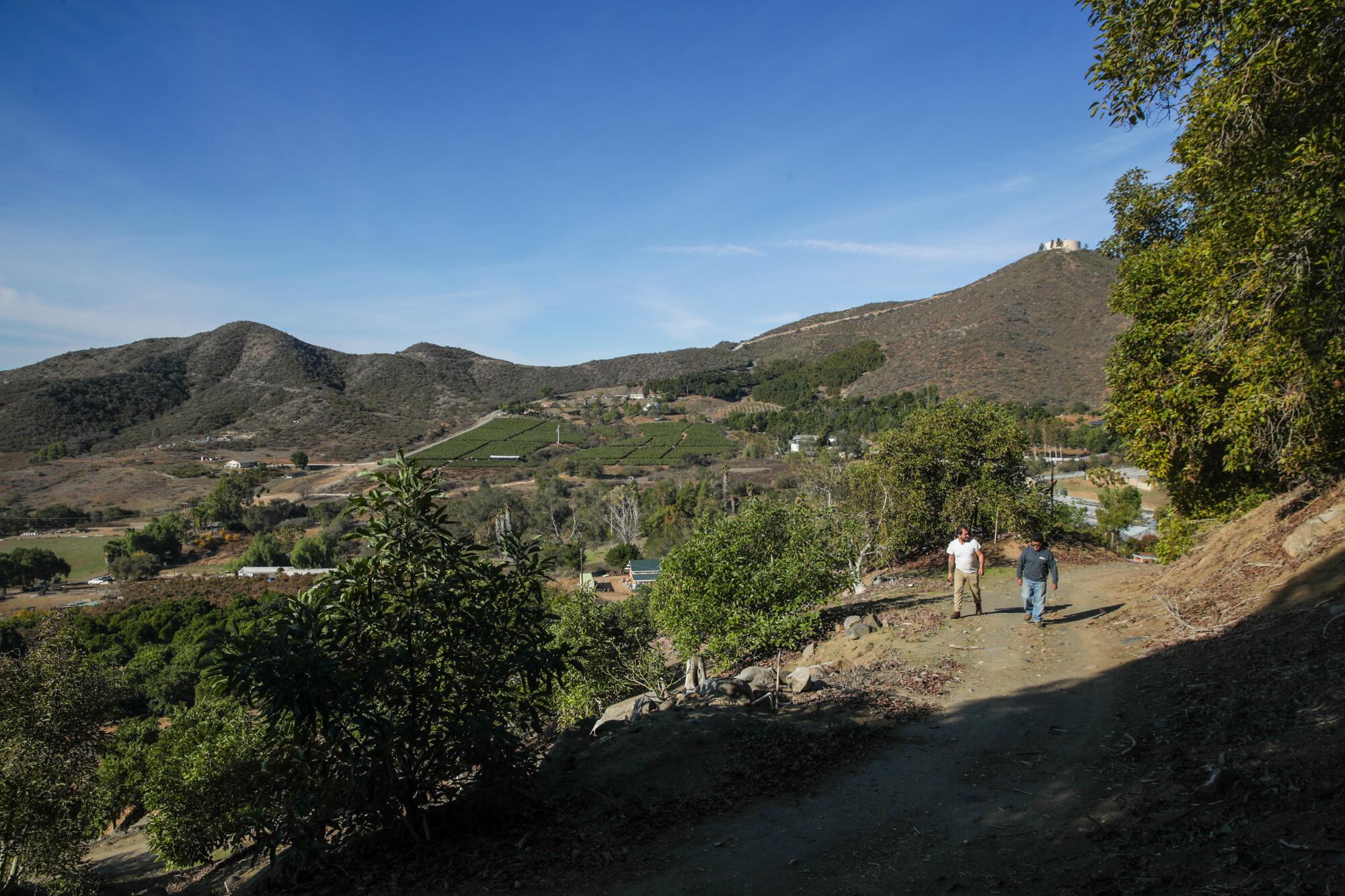
It’s not uncommon for purveyors to network with other growers and commission a future crop. Rick’s Produce works with a field in Chino whose farmers planted roughly 5,000 pounds of tomatoes for Dominguez. In 2020, when those tomatoes were ready, the world was still deep in the pandemic.
Orozco and Harning hatched a plan: They could process the tomatoes into bottled sauces, thereby extending the window for Dominguez to sell them, and hopefully make back some of his investment. Thanks to the jarred-sauce sales, he was able to recoup his initial investment.
Orozco and Harning processed roughly two tons of tomatoes, hand-writing labels for about 16,000 32-ounce jars of tomato sauce. They were so in over their heads that they’d call friends to come and help them, promising a meal and a fun time in return.
Whether they serve burritos, rotis, pizza, bagels or curries, the deliciousness delivered at these 16 Los Angeles establishments far outweighs their cost.
“We knew that we could do it, but that was like, sick of us, you know?” Orozco laughed. “It’s just a lot of work. But Café Tropical helped us so much, like since the very beginning.”
The long-running Cuban bakery in Silver Lake served as the occasional base for the operation until the couple landed their own commercial kitchen space in late 2020. It also served as the first customers for their kombucha in the early days of Sunset Cultures, a home operation that was then brewing only five gallons at a time. (Batches now clock in around 55 to 65 gallons.)
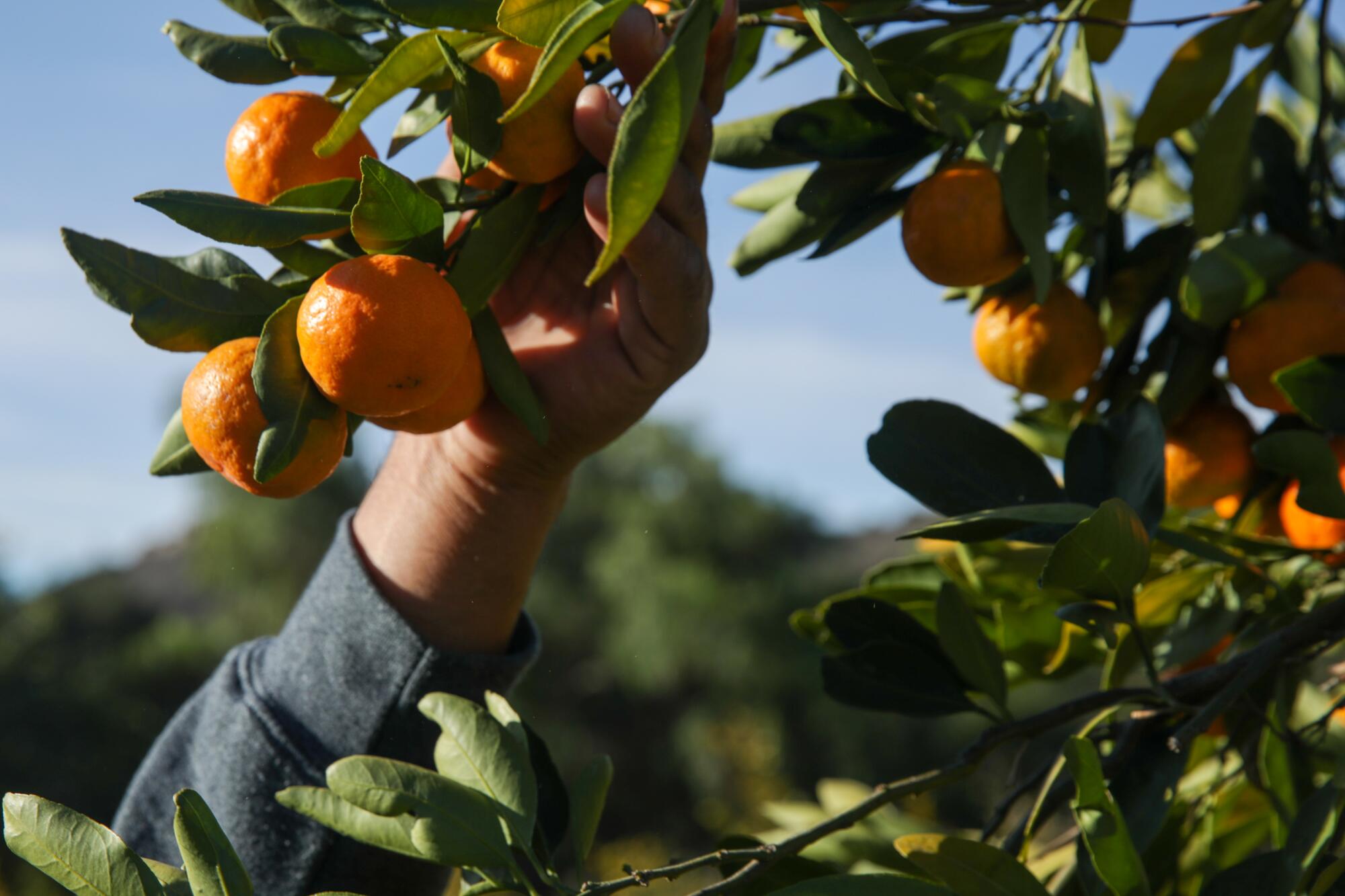
They began with four core flavors of kombucha, now the tentpole of the brand, and their first launch is still one of their favorites: strawberries and wild fennel flowers, both sourced from Rick’s Produce. Another early flavor used wild elderberry they’d foraged themselves while on pandemic walks, paired with Santa Rosa plums from Ken’s Top Notch Produce. Stone fruits, citrus, Buddha’s hand, berries, Sichuan peppercorns, fermented honey, fresh ginger, jujubes and herbs all began making their way into effervescent, raw kombucha in hues of bright purples and pinks and yellows.
Every time they’d make a batch, they’d notice new byproduct from the product made from byproduct; they’d previously composted it, but within the last six months they’ve begun making jam, giving new life to the lightly boiled strawberries, nectarines and other fruits. Now, 5% to 10% of the jam fruit is repurposed from kombucha byproduct.
Like the flavors, the business plan has changed over the course of the last two years. In the beginning, farmers would give the pair their surplus produce, Harning and Orozco would ferment or otherwise preserve it, and the pair would hand the finished product back to the farmers to help them make ends meet during the pandemic. From whatever the farmers were able to sell from that, the duo would receive a cut. Things look a little different now. These days, Sunset Cultures purchases discarded or surplus fruit and then manufactures and sells its goods directly. Harning and Orozco split up romantically, and Harning, while still a partner in the business, is no longer as involved in day-to-day production, though they still remain close. Someday they might even open a bar and a restaurant together. “But we haven’t gotten there yet,” Orozco said.
For now, their project remains one of L.A.’s most popular homespun kombucha brands, and one that’s increasingly exploring condiments and pantry goods. The label can be found in roughly 40 retail shops and online, with expansion into more cities expected in 2023. While the duo would love to branch out nationally, the grassroots ethos is part of the charm: helping hyper-local farmers to make a profit by making something entirely new — and delicious — from their discards.
More to Read
Eat your way across L.A.
Get our weekly Tasting Notes newsletter for reviews, news and more.
You may occasionally receive promotional content from the Los Angeles Times.
